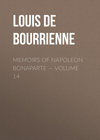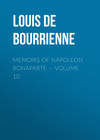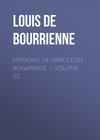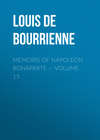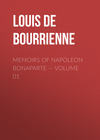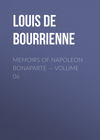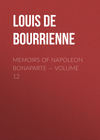Czytaj książkę: «Memoirs of Napoleon Bonaparte — Complete», strona 49
The grave having closed over these two brothers,—[The Fauchers were twin brothers, distinguished in the war of the Revolution, and made brigadier-generals at the same time on the field of battle. After the Cent Jours they refused to recognise the Bourbons, and were shot by sentence of court-martial at Bordeaux. (Bouillet)]—I shall merely state that they wrote me a letter the evening preceding their execution, in which they begged me to forgive their conduct towards me. The following is an extract from this letter:
In our dungeon we hear our sentence of death being cried in the streets. To-morrow we shall walk to the scaffold; but we will meet death with such calmness and courage as shall make our executioners blush. We are sixty years old, therefore our lives will only be shortened by a brief space. During our lives we have shared in common, illness, grief, pleasure, danger, and good fortune. We both entered the world on the same day, and on the same day we shall both depart from it. As to you, sir....
I suppress what relates to myself.
The hour of the grand levee arrived just as the singular interview which I have described terminated. I remained a short time to look at this phantasmagoria. Duroc was there. As soon as he saw me he came up, and taking me into the recess of a window told me that Moreau's guilt was evident, and that he was about to be put on his trial. I made some observations on the subject, and in particular asked whether there were sufficient proofs of his guilt to justify his condemnation? "They should be cautious," said I; "it is no joke to accuse the conqueror of Hohenlinden." Duroc's answer satisfied me that he at least had no doubt on the subject. "Besides," added he, "when such a general as Moreau has been between two gendarmes he is lost, and is good for nothing more. He will only inspire pity." In vain I tried to refute this assertion so entirely contrary to facts, and to convince Duroc that Moreau would never be damaged by calling him "brigand," as was the phrase then, without proofs. Duroc persisted in his opinion. As if a political crime ever sullied the honour of any one! The result has proved that I judged rightly.
No person possessing the least degree of intelligence will be convinced that the conspiracy of Moreau, Georges, Pichegru, and the other persons accused would ever have occurred but for the secret connivance of Fouché's police.
Moreau never for a moment desired the restoration of the Bourbons. I was too well acquainted with M. Carbonnet, his most intimate friend, to be ignorant of his private sentiments. It was therefore quite impossible that he could entertain the same views as Georges, the Polignacs, Riviera, and others; and they had no intention of committing any overt acts. These latter persons had come to the Continent solely to investigate the actual state of affairs, in order to inform the Princes of the House of Bourbon with certainty how far they might depend on the foolish hopes constantly held out to them by paltry agents, who were always ready to advance their own interests at the expense of truth. These agents did indeed conspire, but it was against the Treasury of London, to which they looked for pay.
Without entering into all the details of that great trial I will relate some facts which may assist in eliciting the truth from a chaos of intrigue and falsehood.
Most of the conspirators had been lodged either in the Temple or La Force, and one of them, Bouvet de Lozier, who was confined in the Temple, attempted to hang himself. He made use of his cravat to effect his purpose, and had nearly succeeded, when a turnkey by chance entered and found him at the point of death. When he was recovered he acknowledged that though he had the courage to meet death, he was unable to endure the interrogatories of his trial, and that he had determined to kill himself, lest he might be induced to make a confession. He did in fact confess, and it was on the day after this occurred that Moreau was arrested, while on his way from his country-seat of Grosbois to Paris.
Fouché, through the medium of his agents, had given Pichegru, Georges, and some other partisans of royalty, to understand that they might depend on Moreau, who, it was said, was quite prepared. It is certain that Moreau informed Pichegru that he (Pichegru) had been deceived, and that he had never been spoken to on the subject. Russillon declared on the trial that on the 14th of March the Polignacs said to some one, "Everything is going wrong—they do not understand each other. Moreau does not keep his word. We have been deceived." M. de Riviera declared that he soon became convinced they had been deceived, and was about to return to England when he was arrested. It is certain that the principal conspirators obtained positive information which confirmed their suspicions. They learned Moreau's declaration from Pichegru. Many of the accused declared that they soon discovered they had been deceived; and the greater part of them were about to quit Paris, when they were all arrested, almost at one and the same moment. Georges was going into La Vendée when he was betrayed by the man who, with the connivance of the police, had escorted him ever since his departure from London, and who had protected him from any interruption on the part of the police so long as it was only necessary to know where he was, or what he was about. Georges had been in Paris seven months before it was considered that the proper moment had arrived for arresting him.
The almost simultaneous arrest of the conspirators proves clearly that the police knew perfectly well where they could lay their hands upon them.
When Pichegru was required to sign his examination he refused. He said it was unnecessary; that, knowing all the secret machinery of the police, he suspected that by some chemical process they would erase all the writing except the signature, and afterwards fill up the paper with statements which he had never made. His refusal to sign the interrogatory, he added, would not prevent him from repeating before a court of justice the truth which he had stated in answer to the questions proposed to him. Fear was entertained of the disclosures he might make respecting his connection with Moreau, whose destruction was sought for, and also with respect to the means employed by the agents of Fouché to urge the conspirators to effect a change which they desired.
On the evening of the 15th of February I heard of Moreau's arrest, and early next morning I proceeded straight to the Rue St. Pierre, where M. Carbonnet resided with his nephew. I was anxious to hear from him the particulars of the general's arrest. What was my surprise! I had hardly time to address myself to the porter before he informed me that M. Carbonnet and his nephew were both arrested. "I advise you, sir," added the man, "to retire without more ado, for I can assure you that the persons who visit M. Carbonnet are watched."—"Is he still at home?" said I. "Yes, Sir; they are examining his papers."—"Then," said I, "I will go up." M. Carbonnet, of whose friendship I had reason to be proud, and whose memory will ever be dear to me, was more distressed by the arrest of his nephew and Moreau than by his own. His nephew was, however, liberated after a few hours. M. Carbonnet's papers were sealed up, and he was placed in solitary confinement at St. Pelagic.
Thus the police, who previously knew nothing, were suddenly informed of all. In spite of the numerous police agents scattered over France, it was only discovered by the declarations of Bouvet de Lozier that three successive landings had been effected, and that a fourth was expected, which, however, did not take place, because General Savary was despatched by the First Consul with orders to seize the persons whose arrival was looked for. There cannot be a more convincing proof of the fidelity of the agents of the police to their old chief, and their combined determination of trifling with their new one,
CHAPTER XXII
1804.
The events of 1804—Death of the Duc d'Enghien—Napoleon's arguments at St. Helena—Comparison of dates—Possibility of my having saved the Duc d'Enghien's life—Advice given to the Duc d'Enghien—Sir Charles Stuart—Delay of the Austrian Cabinet—Pichegru and the mysterious being—M. Massias—The historians of St. Helena— Bonaparte's threats against the emigrants and M. Cobentzel— Singular adventure of Davoust's secretary—The quartermaster— The brigand of La Vendée.
In order to form a just idea of the events which succeeded each other so rapidly at the commencement of 1804 it is necessary to consider them both separately and connectedly. It must be borne in mind that all Bonaparte's machinations tended to one object, the foundation of the French Empire in his favour; and it is also essential to consider how the situation of the emigrants, in reference to the First Consul, had changed since the declaration of war. As long as Bonaparte continued at peace the cause of the Bourbons had no support in foreign Cabinets, and the emigrants had no alternative but to yield to circumstances; but on the breaking out of a new war all was changed. The cause of the Bourbons became that of the powers at war with France; and as many causes concurred to unite the emigrants abroad with those who had returned but half satisfied, there was reason to fear something from their revolt, in combination with the powers arrayed against Bonaparte.
Such was the state of things with regard to the emigrants when the leaders and accomplices of Georges' conspiracy were arrested at the very beginning of 1804. The assassination of the Duc d'Enghien
—[Louis Antoine Henri de Bourbon, Duc d'Enghien (1772-1804), son of the Duc de Bourbon, and grandson of the Prince de Condé, served against France in the army of Condé. When this force was disbanded he stayed at Ettenheim on account of a love affair with the Princesse Charlotte de Rohan-Rochefort. Arrested in the territory of Baden, he was taken to Vincennes, and after trial by court-martial shot in the moat, 21st May 1804. With him practically ended the house of Bourbon-Condé as his grandfather died in 1818, leaving only the Duc de Bourbon, and the Princesee Louise Adelaide, Abbesse de Remiremont, who died in 1824.]—
took place on the 21st of March; on the 30th of April appeared the proposition of the Tribunate to found a Government in France under the authority of one individual; on the 18th of May came the 'Senatus-consulte', naming Napoleon Bonaparte EMPEROR, and lastly, on the 10th. of June, the sentence of condemnation on Georges and his accomplices. Thus the shedding of the blood of a Bourbon, and the placing of the crown of France on the head of a soldier of fortune were two acts interpolated in the sanguinary drama of Georges' conspiracy. It must be remembered, too, that during the period of these events we were at war with England, and on the point of seeing Austria and the Colossus of the north form a coalition against the new Emperor.
I will now state all I know relative to the death of the Duc d'Enghien. That unfortunate Prince, who was at Ettenheim, in consequence of a love affair, had no communication whatever with those who were concocting a plot in the interior. Machiavelli says that when the author of a crime cannot be discovered we should seek for those to whose advantage it turns. In the present case Machiavelli's advice will find an easy application, since the Duke's death could be advantageous only to Bonaparte, who considered it indispensable to his accession to the crown of France. The motives may be explained, but can they be justified? How could it ever be said that the Duc d'Enghien perished as a presumed accomplice in the conspiracy of Georges?
Moreau was arrested on the 15th of February 1804, at which time the existence of the conspiracy was known. Pichegru and Georges were also arrested in February, and the Duc d'Enghien not till the 15th of March. Now if the Prince had really been concerned in the plot, if even he had a knowledge of it, would he have remained at Ettenheim for nearly a month after the arrest of his presumed accomplices, intelligence of which he might have obtained in the space of three days? Certainly not. So ignorant was he of that conspiracy that when informed at Ettenheim of the affair he doubted it, declaring that if it were true his father and grandfather would have made him acquainted with it. Would so long an interval have been suffered to elapse before he was arrested? Alas! cruel experience has shown that that step would have been taken in a few hours.
The sentence of death against Georges and his accomplices was not pronounced till the 10th of June 1804, and the Duc d'Enghien was shot on the 21st of March, before the trials were even commenced. How is this precipitation to be explained? If, as Napoleon has declared, the young Bourbon was an accomplice in the crime, why was he not arrested at the time the others were? Why was he not tried along with them, on the ground of his being an actual accomplice; or of being compromised, by communications with them; or, in short, because his answers might have thrown light on that mysterious affair? How was it that the name of the illustrious accused was not once mentioned in the course of that awful trial?
It can scarcely be conceived that Napoleon could say at St. Helena, "Either they contrived to implicate the unfortunate Prince in their project, and so pronounced his doom, or, by omitting to inform him of what was going on, allowed him imprudently to slumber on the brink of a precipice; for he was only a stone's cast from the frontier when they were about to strike the great blow in the name and for the interest of his family."
This reasoning is not merely absurd, it is atrocious. If the Duke was implicated by the confession of his accomplices, he should have been arrested and tried along with them. Justice required this. If he was not so implicated, where is the proof of his guilt? Because some individuals, without his knowledge, plotted to commit a crime in the name of his family he was to be shot! Because he was 130 leagues from the scene of the plot, and had no connection with it, he was to die! Such arguments cannot fail to inspire horror. It is absolutely impossible any reasonable person can regard the Duc d'Enghien as an accomplice of Cadoudal; and Napoleon basely imposed on his contemporaries and posterity by inventing such falsehoods, and investing them with the authority of his name.
Had I been then in the First Consul's intimacy I may aver, with as much confidence as pride, that the blood of the Duc d'Enghien would not have imprinted an indelible stain on the glory of Bonaparte. In this terrible matter I could have done what no one but me could even attempt, and this on account of my position, which no one else has since held with Bonaparte. I quite admit that he would have preferred others to me, and that he would have had more friendship for them than for me, supposing friendship to be compatible with the character of Bonaparte, but I knew him better than any one else. Besides, among those who surrounded him I alone could have permitted myself some return to our former familiarity on account of our intimacy of childhood. Certainly, in a matter which permanently touched the glory of Bonaparte, I should not have been restrained by the fear of some transitory fit of anger, and the reader has seen that I did not dread disgrace. Why should I have dreaded it? I had neither portfolio, nor office, nor salary, for, as I have said, I was only with Bonaparte as a friend, and we had, as it were, a common purse. I feel a conviction that it would have been very possible for me to have dissuaded Bonaparte from his fatal design, inasmuch as I positively know that his object, after the termination of the peace, was merely to frighten the emigrants, in order to drive them from Ettenheim, where great numbers, like the Duc d'Enghien, had sought refuge. His anger was particularly directed against a Baroness de Reith and a Baroness d'Ettengein, who had loudly vituperated him, and distributed numerous libels on the left bank of the Rhine. At that period Bonaparte had as little design against the Duc d'Enghien's life as against that of any other emigrant. He was more inclined to frighten than to harm him, and certainly his first intention was not to arrest the Prince, but, as I have said, to frighten the 'emigres', and to drive them to a distance. I must, however, admit that when Bonaparte spoke to Rapp and Duroc of the emigrants on the other side of the Rhine he expressed himself with much irritability: so much so, indeed, that M. de Talleyrand, dreading its effects for the Duc d'Enghien, warned that Prince, through the medium of a lady to whom he was attached, of his danger, and advised him to proceed to a greater distance from the frontier. On receiving this notice the Prince resolved to rejoin his grandfather, which he could not do but by passing through the Austrian territory. Should any doubt exist as to these facts it may be added that Sir Charles Stuart wrote to M. de Cobentzel to solicit a passport for the Duc d'Enghien; and it was solely owing to the delay of the Austrian Cabinet that time was afforded for the First Consul to order the arrest of the unfortunate Prince as soon as he had formed the horrible resolution of shedding the blood of a Bourbon. This resolution could have originated only with himself, for who would have dared to suggest it to him? The fact is, Bonaparte knew not what he did. His fever of ambition amounted to delirium; and he knew not how he was losing himself in public opinion because he did not know that opinion, to gain which he would have made every sacrifice.
When Cambacérès (who, with a slight reservation, had voted the death of Louis XVI.) warmly opposed in the Council the Duc d'Enghien's arrest, the First Consul observed to him, "Methinks, Sir, you have grown very chary of Bourbon blood!"
Meanwhile the Duc d'Enghien was at Ettenheim, indulging in hope rather than plotting conspiracies. It is well known that an individual made an offer to the Prince de Condé to assassinate the First Consul, but the Prince indignantly rejected the proposition, and nobly refused to recover the rights of the Bourbons at the price of such a crime. The individual above-mentioned was afterwards discovered to be an agent of the Paris police, who had been commissioned to draw the Princes into a plot which would have ruined them, for public feeling revolts at assassination under any circumstances.
It has been alleged that Louis XVIII.'s refusal to treat with Bonaparte led to the fatal catastrophe of the Duc d'Enghien's death. The first correspondence between Louis XVIII. and the First Consul, which has been given in these Memoirs, clearly proves the contrary. It is certainly probable that Louis XVIII.'s refusal to renounce his rights should have irritated Bonaparte. But it was rather late to take his revenge two years after, and that too on a Prince totally ignorant of those overtures. It is needless to comment on such absurdities. It is equally unnecessary to speak of the mysterious being who often appeared at meetings in the Faubourg St. Germain, and who was afterwards discovered to be Pichegru.
A further light is thrown on this melancholy catastrophe by a conversation Napoleon had, a few days after his elevation to the imperial throne, with M. Masaias, the French Minister at the Court of the Grand Duke of Baden. This conversation took place at Aix-la-Chapelle. After some remarks on the intrigues of the emigrants Bonaparte observed, "You ought at least to have prevented the plots which the Duc d'Enghien was hatching at Ettenheim."—"Sire, I am too old to learn to tell a falsehood. Believe me, on this subject your Majesty's ear has been abused."—"Do you not think, then, that had the conspiracy of Georges and Pichegru proved successful, the Prince would have passed the Rhine, and have come post to Paris?"
M. Massias, from whom I had these particulars, added, "At this last question of the Emperor I hung down my head and was silent, for I saw he did not wish to hear the truth."
Now let us consider, with that attention which the importance of the subject demands, what has been said by the historians of St. Helena.
Napoleon said to his companions in exile that "the Duc d'Enghien's death must be attributed either to an excess of zeal for him (Napoleon), to private views, or to mysterious intrigues. He had been blindly urged on; he was, if he might say so, taken by surprise. The measure was precipitated, and the result predetermined."
This he might have said; but if he did so express himself, how are we to reconcile such a declaration with the statement of O'Meara? How give credit to assertions so very opposite?
Napoleon said to M. de Las Casas:
"One day when alone, I recollect it well, I was taking my coffee, half seated on the table at which I had just dined, when suddenly information was brought to me that a new conspiracy had been discovered. I was warmly urged to put an end to these enormities; they represented to me that it was time at last to give a lesson to those who had been day after day conspiring against my life; that this end could only be attained by shedding the blood of one of them; and that the Duc d'Enghien, who might now be convicted of forming part of this new conspiracy, and taken in the very act, should be that one. It was added that he had been seen at Strasburg; that it was even believed that he had been in Paris; and that the plan was that he should enter France by the east at the moment of the explosion, whilst the Duc de Berri was disembarking in the west. I should tell you," observed the Emperor, "that I did not even know precisely who the Duc d'Enghien was (the Revolution having taken place when I was yet a very young man, and I having never been at Court), and that I was quite in the dark as to where he was at that moment. Having been informed on those points I exclaimed that if such were the case the Duke ought to be arrested, and that orders should be given to that effect. Everything had been foreseen and prepared; the different orders were already drawn up, nothing remained to be done but to sign them, and the fate of the young Prince was thus decided."
Napoleon next asserts that in the Duke's arrest and condemnation all the usual forms were strictly observed. But he has also declared that the death of that unfortunate Prince will be an eternal reproach to those who, carried away by a criminal zeal, waited not for their Sovereign's orders to execute the sentence of the court-martial. He would, perhaps, have allowed the Prince to live; but yet he said, "It is true I wished to make an example which should deter."
It has been said that the Duc d'Enghien addressed a letter to Napoleon, which was not delivered till after the execution. This is false and absurd! How could that Prince write to Bonaparte to offer him his services and to solicit the command of an army? His interrogatory makes no mention of this letter, and is in direct opposition to the sentiments which that letter would attribute to him. The truth is, no such letter ever existed. The individual who was with the Prince declared he never wrote it. It will never be believed that any one would have presumed to withhold from Bonaparte a letter on which depended the fate of so august a victim.
In his declarations to his companions in exile Napoleon endeavoured either to free himself of this crime or to justify it. His fear or his susceptibility was such, that in discoursing with strangers he merely said, that had he known of the Prince's letter, which was not delivered to him.—God knows why!—until after he had breathed his last, he would have pardoned him. But at a subsequent date he traced, with his own hand, his last thoughts, which he supposed would be consecrated in the minds of his contemporaries, and of posterity. Napoleon, touching on the subject which he felt would be one of the most important attached to his memory, said that if the thing were to do again he would act as he then did. How does this declaration tally with his avowal, that if he had received the Prince's letter he should have lived? This is irreconcilable. But if we compare all that Napoleon said at St. Helena, and which has been transmitted to us by his faithful followers; if we consider his contradictions when speaking of the Duc d'Enghien's death to strangers, to his friends, to the public, or to posterity, the question ceases to be doubtful. Bonaparte wished to strike a blow which would terrify his enemies. Fancying that the Duc de Berri was ready to land in France, he despatched his aide de camp Savary, in disguise, attended by gendarmes, to watch the Duke's landing at Biville, near Dieppe. This turned out a fruitless mission. The Duke was warned in time not to attempt the useless and dangerous enterprise, and Bonaparte, enraged to see one prey escape him, pounced upon another. It is well known that Bonaparte often, and in the presence even of persons whom he conceived to have maintained relations with the partisans of the Bourbons at Paris, expressed himself thus: "I will put an end to these conspiracies. If any of the emigrants conspire they shall be shot. I have been told that Cobentzel harbours some of them. I do not believe this; but if it be true, Cobentzel shall be arrested and shot along with them. I will let the Bourbons know I am not to be trifled with." The above statement of facts accounts for the suppositions respecting the probable influence of the Jacobins in this affair. It has been said, not without some appearance of reason, that to get the Jacobins to help him to ascend the throne Bonaparte consented to sacrifice a victim of the blood royal, as the only pledge capable of ensuring them against the return of the proscribed family. Be this as it may, there are no possible means of relieving Bonaparte from his share of guilt in the death of the Duc d'Enghien.
To the above facts, which came within my own knowledge, I may add the following curious story, which was related to me by an individual who himself heard it from the secretary of General Davoust.
Davoust was commanding a division in the camp of Boulogne, and his secretary when proceeding thither to join him met in the diligence a man who seemed to be absorbed in affliction. This man during the whole journey never once broke silence but by some deep sighs, which he had not power to repress. General Davoust's secretary observed him with curiosity and interest, but did not venture to intrude upon his grief by any conversation. The concourse of travellers from Paris to the camp was, however, at that time very great, and the inn at which the diligence stopped in the evening was so crowded that it was impossible to assign a chamber to each traveller. Two, therefore, were put into one room, and it so happened that the secretary was lodged with his mysterious travelling companion.
When they were alone he addressed him in a torso of interest which banished all appearance of intrusion. He inquired whether the cause of his grief was of a nature to admit of any alleviation, and offered to render him any assistance in his power. "Sir," replied the stranger, "I am much obliged for the sympathy you express for me—I want nothing. There is no possible consolation for me. My affliction can end only with my life. You shall judge for yourself, for the interest you seem to take in my misfortune fully justifies my confidence. I was quartermaster in the select gendarmerie, and formed part of a detachment which was ordered to Vincennes. I passed the night there under arms, and at daybreak was ordered down to the moat with six men. An execution was to take place. The prisoner was brought out, and I gave the word to fire. The man fell, and after the execution I learned that we had shot the Duc d'Enghien. Judge of my horror! . . . I knew the prisoner only by the name of the brigand of La Vendée! . . . I could no longer remain in the service—I obtained my discharge, and am about to retire to my family. Would that I had done so sooner!" The above has been related to me and other persons by Davoust's secretary, whom I shall not name.












